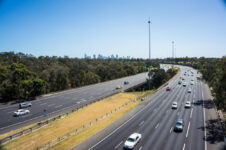Driver Who Filmed Dying Police Officer Pleads Guilty

In April 2020, 42-year old Richard Pusey was pulled over by police while driving his Porsche on Melbourne’s Eastern Freeway at speeds of up to 149km/h.
After four police officers exited their vehicle – which had parked in an emergency lane – they were hit by a truck, which resulted in their deaths.
At the time of the tragedy, Mr Pusey was on bail for theft and assault charges.
After the incident, Mr Pusey was charged with 16 offences including driving at a dangerous speed, reckless conduct endangering life, failing to render assistance at the scene of a collision and possessing a drug of dependence.
Mr Pusey filmed the wreckage on his phone following the crash and showed the footage to others before deleting it, and providing a different phone to police.
The alleged conduct led to charges of destroying evidence, attempting to pervert the course of justice and outraging public decency.
Senior constables Kevin King and constables Glen Humphris and Josh Prestney also died in the tragic collision.
This week, Mr Pusey pleaded guilty to three charges relating to the crash: possessing a drug of dependence, reckless conduct endangering serious injury and outraging public decency.
Filming dying officer
The outraging public decency charge relates to Mr Pusey using his mobile phone to film Leading Senior Constable Lynette Taylor while she lay dying.
In the video, Mr Pusey can be heard saying: “There you go, amazing, absolutely amazing. All I wanted to do was go home and have some sushi and now you fucked my fucking car.”
He also says: “Look at that, man. You cunts, you fucking cunts. I guess I’ll be getting an Uber home.”
He left the scene and while he did not post the footage to social media, he sent it to several other people.
Outraging public decency
Prosecutors and Mr Pusey’s criminal defence lawyers had been at loggerheads for months over the over the outraging public decency charge.
The defence had pushed for the charge to be withdrawn and replaced by the less-serious crime of offensive conduct, but the prosecution refused.
In court
At a court hearing last year, prosecutor Robyn Harper told the Melbourne Magistrates’ Court that outraging public decency is a common law offence; meaning it is not contained in legislation but rather is an offence developed over time through case law.
She pointed to six cases where the offence had been prosecuted.
“This very court heard the offence of an act outraging public decency on the 8th of August 2014 and imposed a sentence of imprisonment of one month for that charge in that instance,” Ms Harper submitted.
“That indicates from the outset that this offence has been dealt with in this jurisdiction on a previous occasion.”
Prosecutors also cited a UK case from 2007, when Anthony Anderson was imprisoned for three years for urinating on a dying disabled woman who fell in the street in the UK.
Pleads guilty
Mr Pusey pleaded guilty to outraging public decency and two other offences earlier this week.
There is no maximum penalty for the offence, which means Mr Pusey’s punishment will be up to the discretion of the court.
His case has been adjourned for sentencing.
The crime of offensive conduct in New South Wales
Offence Conduct is a crime under section 4 of the Summary Offences Act 1988 (NSW) which carries a maximum penalty of 3 months in prison, or a fine of $660.
To establish the offence, the prosecution must prove beyond reasonable doubt:
- That you conducted yourself in an offensive manner, and
- The conduct occurred in, near or within hearing from a public place or school.
There is no list of conduct that is considered to be ‘offensive’.
The test is whether a hypothetical person who is “reasonably contemporary” and “not too thin-skinned” would consider it to be offensive.
The conduct must be “… calculated to would the feelings, arouse anger or resentment or disgust in the mind of a reasonable person.”
“What has to be considered…is whether the conduct in question, even if in some sense hurtful or blameworthy, or improper, is also offensive”. “The mere expression of political views… does not… amount to offensive…”.
Words alone cannot constitute the offence.
A ‘public place’ is defined as any place or part of a premises which is open to or used by the whole or part of the public whether or not payment is required to access it.
This includes:
- Pubs and clubs,
- Restaurants,
- Shopping centres,
- Retail stores, and
- Private lands which allow public access.
A defence to the charge is that you had a reasonable excuse for engaging in the conduct, such as being naked at a designated nude beach.
Going to court for a traffic offence?
If you are going to court for a traffic offence, call or email Sydney Criminal Lawyers anytime to arrange a free first consultation with an experienced, specialist traffic lawyer who will accurately advise you of your options, the best way forward, and fight for the optimal outcome in your specific situation.








